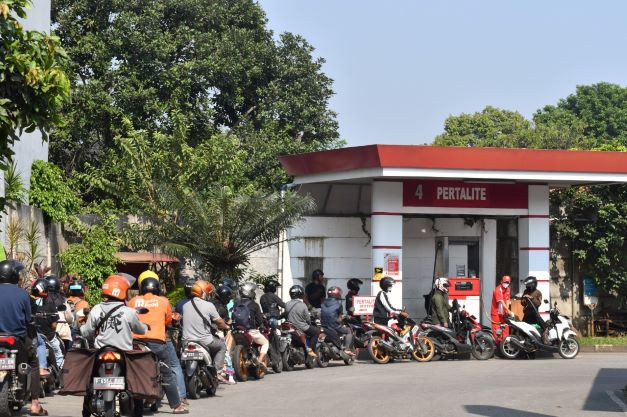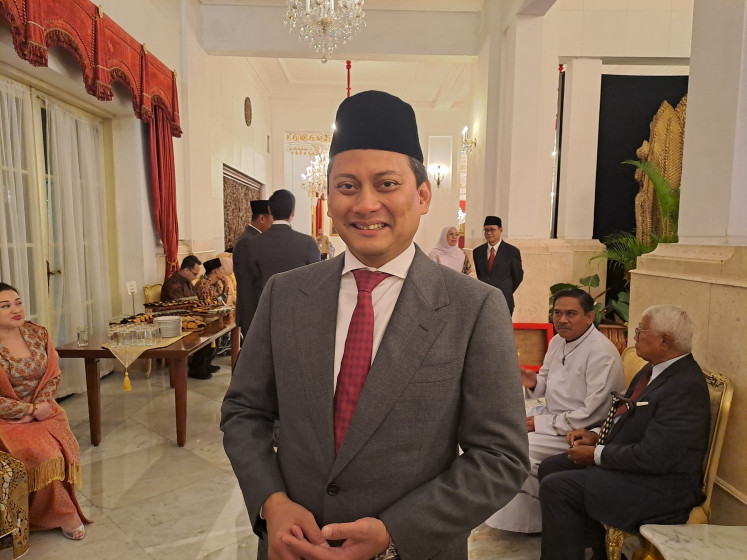Popular Reads
Top Results
Can't find what you're looking for?
View all search resultsPopular Reads
Top Results
Can't find what you're looking for?
View all search resultsGovt may overshoot subsidized fuel quota as sales curb lags
The government is in danger of selling more subsidized motor fuel than it intends this year, as a delay in purchase restrictions allows unfettered access to cheaper fuel brands to continue.
Change text size
Gift Premium Articles
to Anyone
T
he government is in danger of selling more subsidized motor fuel than it intends this year, a ministry official has said, as a delay in purchase restrictions allows unfettered access to cheaper fuel brands to continue.
The Downstream Oil and Gas Regulatory Agency (BPH Migas) has set the subsidized fuel quota at 49.56 million kiloliters this year, up 2.6 million kl from last year, with 32.56 million kl allotted for RON-90 Pertalite gasoline and 17 million kl for Solar-brand diesel.
The quota marks a slight change from last year’s realized sales of 29.49 million kl of Pertalite and 17.6 million kl of Solar.
Tutuka Ariaji, oil and gas director general at the Energy and Mineral Resources Ministry said on Tuesday that it was likely consumption would exceed the fuel quota unless restrictions were put in place to stop ineligible customers from buying subsidized fuel.
But before such a restriction could be put in place, he noted, the revision of Presidential Regulation No. 191/2014 had to be completed. It was supposed to have been finished in August of last year.
The ministry is working to pass the revision but as of Tuesday had yet to secure approval from the State Secretariat.
“Finishing the regulation is an urgent matter [...] given the possibility that Solar and Pertalite [purchases] will exceeded the quota this year if there are no purchase curbs in place,” Tutuka told lawmakers on House Commission VII overseeing energy and mineral resources.
Read also: /business/2022/08/15/trade-surplus-narrows-on-ending-commodity-windfall.html" target="_blank">Trade surplus narrows on ‘ending’ commodity windfall
Fuel subsidies have been a recurring problem for the Indonesian economy. Last year, skyrocketing global energy prices required the country to allocate Rp 551 trillion to maintain prevailing energy subsidy levels, more than three times the initial budget of Rp 152.5 trillion.
The government had considered a sales curb last year but opted instead for a price hike.
Higher prices for coal and crude palm oil (CPO), the country’s two biggest exports, provided a lifeline for increased spending on energy and food subsidies last year to insulate the domestic economy from inflation.
But Statistics Indonesia (BPS) has warned that the windfall is ending as commodity prices begin declining.
Josua Pardede, chief economist at publicly listed Bank Permata, said purchase restrictions, or a lack thereof, would be the chief determinant of whether the government exceeded its fuel subsidy quota this year.
But price gaps between subsidized and unsubsidized fuel brands would also play a major role.
“The quota has been deemed sufficient, but we also need to pay attention to the price disparity between the Pertalite brand and other brands,” Josua told The Jakarta Post on Thursday.
Ahmad Zuhdi Dwi Kusuma, an analyst at state-owned lender Bank Mandiri, said it was possible that subsidized fuel purchases would exceed the quota as public mobility recovered but that a big overshoot was unlikely.
“We expect fuel consumption to stay at a similar level to last year, but since Indonesia won’t be experiencing a great commodity windfall this year, the government is putting in place several plans, including increasing export levies,” he told the Post on Tuesday.
Read also: /business/2022/08/01/pertamina-delays-curbs-on-subsidized-fuel-purchases.html" target="_blank">Pertamina delays curbs on subsidized fuel purchases
Center of Economics and Law Studies (CELIOS) director Bhima Yudhistira suggested on Thursday that the government reallocate unnecessary spending to cover the possible energy subsidy overshoot, arguing that such subsidies had to be prioritized given their role in supporting the economy.
Alternatively, he said, the government could use any unspent budget from last year to avoid costly debt issuance amid high interest rates.
The government has tasked PT Pertamina Patra Niaga, Pertamina's commercial arm, with enforcing restrictions on the purchase of its subsidized Pertalite and Solar fuel brands, but the company is still collecting customer data through the MyPertamina booths located at Pertamina gas stations, as well as through the company’s website and smartphone app.
The data will be used to determine whether a customer is eligible to purchase subsidized fuel and may be used for further analysis “in accordance with regulatory needs”.










